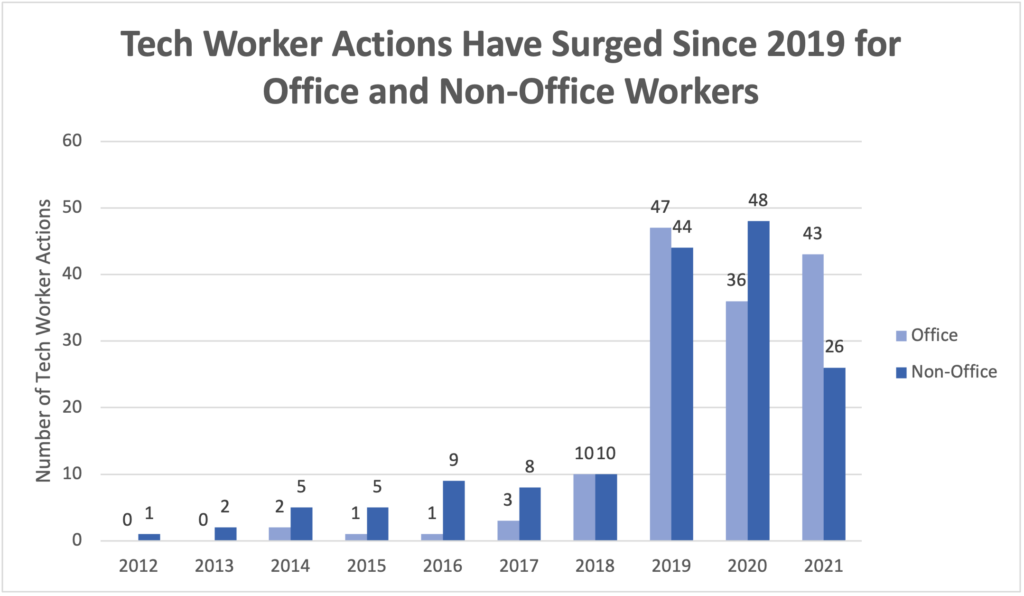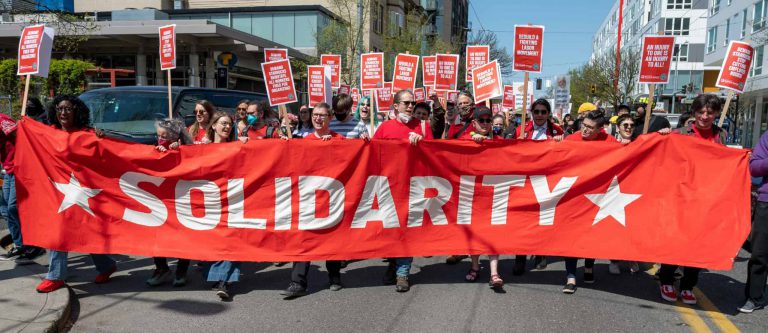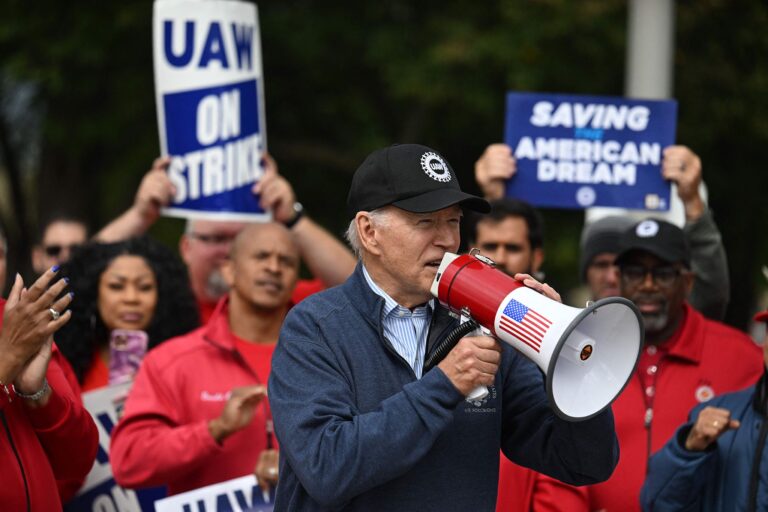
Nicholas Anway is a student at Harvard Law School.
In relative terms, U.S. tech-worker activism is booming. Over 80 percent of the workplace actions taken by tech workers in the past decade have occurred since 2019, according to a recent report from Collective Action in Tech, an organization that documents worker organizing efforts in the tech industry. In 2021 alone, tech workers engaged in nearly 70 workplace actions. That’s an astonishing figure compared to 2012, when they engaged in only one.
“Tech workers” are employees of firms that provide technology-based goods and services. They’re a diverse collection of workers that extends far beyond the black-t-shirt-wearing archetype that the term often invokes.
Perhaps that’s why Collective Action in Tech’s report divides tech workers into two subcategories: those who work in office jobs (“office workers”) and those who do not (“non-office workers”). At first blush, the distinction may seem arbitrary. At Amazon, for example, operations analysts and warehouse workers are employees of the same company, even if they don’t share the same workplace. But the office/non-office worker distinction highlights an important fissure between the issues that have animated tech workers in the recent boom. Although there is overlap between the two groups’ interests, non-office workers have tended to use workplace activism to advocate for better wages, hours and working conditions, whereas office workers (many of whom enjoy better employment conditions than non-office workers) have tended to focus their activism on the ethics of the products they produce. Despite this distinction, both office and non-office tech workers have been taking action at record rates.

According to the report, the post-2019 boom has been driven by three forms of activism: whistleblower actions, informal collective actions and unionization.
Whistleblower Actions
Office workers have driven international outrage against their employers’ ethical practices by blowing the whistle. The Facebook Files were 2021’s most explosive example. Whistleblower Frances Haugen’s revelations to the Wall Street Journal — that, contrary to Facebook’s public assurances, its content moderation systems are unable to catch misinformation, bullying and hate speech reliably at scale; that the company exempts millions of elite users from its content moderation rules; that its algorithms foster misinformation, extremism and political violence; that drug cartels and human traffickers openly use its services; that one in eight of its users report that Facebook is bad for them; that Instagram negatively effects the mental health of young users, especially teenage girls; and that, despite these effects, the company knowingly targets young users — led to legislative hearings in the U.S. and E.U., inspired other whistleblowers from the company to come forward and galvanized efforts by Facebook workers to demand better treatment for content moderators.
An industry-captivating whistleblower action also occurred in 2020 when prominent AI ethics researcher Timnet Gebru spoke out about her firing from Google. Gebru is known for coauthoring a groundbreaking paper which found leading facial recognition systems to be less accurate in identifying women and people of color, creating discrimination risks. She was fired by management for refusing to retract or remove her name from a similar paper examining discrimination risks in Google’s AI products. In support of Gebru, thousands of tech workers and supporters signed a public letter demanding reforms from Google’s leadership.
Informal Collective Actions
Office workers also engaged in highly publicized informal collective actions in 2021, often through employee resource groups (ERGs). The Trans* Employee Resource Group at Netflix, a collective of trans and nonbinary workers and allies, organized a walkout and issued demands of the company in protest of its support for a Dave Chappelle comedy special that was criticized as transphobic. Tech workers at Apple and Google also organized through ERGs — the Apple Muslim Association and the Jewish Diaspora in Tech, respectively — to urge executives to increase company support for Palestinians after an Israeli bombing campaign in Gaza.
However, informal organizing efforts have led to retaliation against office workers. Netflix fired a leader of the Trans* ERG, presumably in retaliation for organizing the walkout. (Netflix asserts that they were terminated on suspicion of leaking metrics to the press.) And last year, the acting head of the National Labor Relations Board stated that Google had “arguably violated” U.S. labor laws when it fired three employees for their informal activism against the company’s contracts with U.S. Customs and Border Protection, an agency charged with administering former President Trump’s child separation policy.
Unionization
Although the rate of tech worker unionization remains below the national union membership rate of around 10 percent, 2021 was an historic year for unionization in the tech industry. In January, office workers at Google formally launched the Alphabet Workers Union, following a campaign with Communication Workers of America, an affiliated union of the AFL-CIO. That organizing effort, aptly named the Campaign to Organize Digital Employees, led to office worker unionization at companies like Medium, Glitch, EveryAction, Mobilize and NPR Digital Media. Non-office workers also formed unions at Imperfect Foods and HelloFresh. In total, twelve tech worker unions formed last year, a record number in the industry.
The unionization trend has continued in 2022 for both office and non-office workers. In March, workers at the New York Times formed the largest tech union in the country when they voted to certify the Times Tech Guild in a NLRB election. At Activision Blizzard, workers have also filed for a union election with the NLRB, the outcome of which Microsoft has pledged to respect as it acquires the video game company. Apple Store employees are working to unionize in at least two locations. And in March of this year, Amazon workers at a Staten Island fulfillment center made history when they voted to become the Amazon Labor Union, the first Amazon workers union in the United States.
Analysis
For both groups of workers, whistleblowing and informal collective action have yielded mixed results. Although whistleblowing has catalyzed legislative reforms, it is unclear what impact they will have on worker power. Despite whistleblower efforts at Facebook, for example, content moderators in the U.S., Ireland, and Kenya continue to face poor working conditions and exposure to traumatizing content. Nor is it clear that informal collectives like ERGs can sustainably impact product decisions without more formalized protections against employer retaliation.
Unionization may offer a more efficacious path forward. Among tech workers, unionization is popular: a mid-2021 poll from Protocol and Morning Consult found that over half of tech workers, including over 60 percent of millennial tech workers, are interested in joining a union. Union contracts can lead to stronger worker protections. And unionization could create opportunities for formal organizing between office workers, non-office workers, and researchers to create upward pressure on management to make more ethical product decisions. For example, also in 2021, Partnership on AI published a framework for AI development teams to use to evaluate the likely impact that their products will have on low-wage workers. A formalized organizing effort to adopt such a framework between office and non-office worker unions could create a sustainable opportunity to build worker voice into product decisions. And this research-driven union organizing strategy could be applied to other cross-cutting interests shared by office and non-office workers, like content moderation. For these reasons, unionization offers both groups of tech workers important opportunities to channel their surging activism into lasting worker power.










Daily News & Commentary
Start your day with our roundup of the latest labor developments. See all
July 4
The DOL scraps a Biden-era proposed rule to end subminimum wages for disabled workers; millions will lose access to Medicaid and SNAP due to new proof of work requirements; and states step up in the noncompete policy space.
July 3
California compromises with unions on housing; 11th Circuit rules against transgender teacher; Harvard removes hundreds from grad student union.
July 2
Block, Nanda, and Nayak argue that the NLRA is under attack, harming democracy; the EEOC files a motion to dismiss a lawsuit brought by former EEOC Commissioner Jocelyn Samuels; and SEIU Local 1000 strikes an agreement with the State of California to delay the state's return-to-office executive order for state workers.
July 1
In today’s news and commentary, the Department of Labor proposes to roll back minimum wage and overtime protections for home care workers, a federal judge dismissed a lawsuit by public defenders over a union’s Gaza statements, and Philadelphia’s largest municipal union is on strike for first time in nearly 40 years. On Monday, the U.S. […]
June 30
Antidiscrimination scholars question McDonnell Douglas, George Washington University Hospital bargained in bad faith, and NY regulators defend LPA dispensary law.
June 29
In today’s news and commentary, Trump v. CASA restricts nationwide injunctions, a preliminary injunction continues to stop DOL from shutting down Job Corps, and the minimum wage is set to rise in multiple cities and states. On Friday, the Supreme Court held in Trump v. CASA that universal injunctions “likely exceed the equitable authority that […]